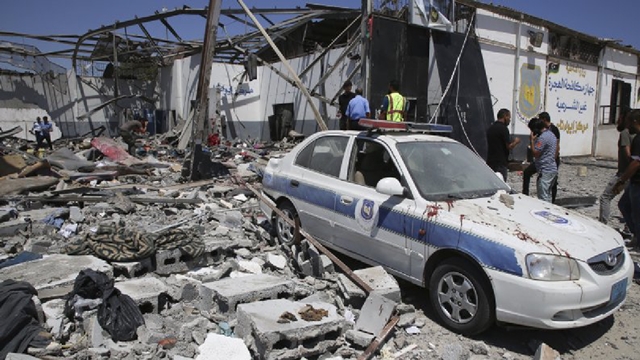Al Fahad
Published:2020-02-18 21:48:49 BdST
UN: Impact of long Libya war on civilians is `incalculable'
The U.N humanitarian coordinator for Libya said Monday the impact of the country's nine-year war on civilians "is incalculable," pointing to its intensity escalating "exponentially" since a rebel commander launched an offensive last April, casualties rising and almost 900,000 people now needing assistance.
Yacoub El Hillo said a 55-point road map for ending the war in Libya which was agreed to by 12 key leaders at a conference in Berlin on Jan. 19, endorsed last week by the U.N. Security Council, and reaffirmed at a meeting in Munich on Sunday has seen "serious violations" in the last 10 days, with new strikes in and around the capital Tripoli.
El Hillo, who is also the U.N. deputy representative for the oil-rich North African country, said in a briefing to journalists by video from Tripoli that the protracted conflict is "severely impacting civilians in all parts of the country on a scale never seen before."
The Berlin peace plan backed a cease-fire, called for compliance with a U.N. arms embargo, and said all countries must refrain from interfering in the conflict between the U.N.-recognized government and the rebel forces of self-styled Gen. Khalifa Hifter, and the country's internal affairs.
On a potentially positive note, a Joint Military Commission comprising representatives of the warring parties is scheduled to begin a second round of talks Tuesday in Geneva under U.N. auspices, with the aim of agreeing to a lasting cease-fire.
The first meeting of a Libyan Political Forum aimed at forming a new government has also been scheduled for Feb. 26 in Geneva.
Libya has been in turmoil since 2011, when a civil war toppled longtime dictator Moammar Gadhafi, who was later killed. In the chaos that followed the country was divided.
A weak U.N.-recognized administration that holds the capital of Tripoli and parts of the country's west is backed by Turkey, which recently sent thousands of soldiers and military equipment to Libya, and to a lesser degree Qatar and Italy as well as local militias.
On the other side is a rival government in the east that supports self-styled Gen. Khalifa Hifter, whose forces launched an offensive to capture the capital last April 4 and are backed by the United Arab Emirates and Egypt as well as France and Russia.
U.N. Secretary-General Antonio Guterres has decried violations of the U.N. embargo since the Berlin conference by supporters of the warring sides.
El Hillo said "the increasing use of explosive weapons has resulted in unnecessary loss of life." pointing to attacks on civilians and civilian infrastructure, particularly health facilities, that have doubled since 2019, resulting in at least 650 civilians killed or injured.
He cited a U.N. mine expert in Libya who said last week that the country has the world's largest uncontrolled ammunition stockpile, with an estimated 150,000 to 200,000 tons of uncontrolled munitions across the country.
Libya "is also the largest theater for drone technology," El Hillo said, stressing that "everyone has something flying in the Libyan sky, it seems."
Turkey's recent move into Libya in "a very heavy way militarily speaking" was to support the government "and create a balance of power so that the capital does not fall," he said.
On the other side, El Hillo cited reports of the UAE financing Chinese-made drones and the Jordanian government selling six drones to Hifter's forces.
"Unless we speak so bluntly and openly, ... unless we start naming and shaming, we will have the resolutions but the reality on the ground will remain appalling, especially for civilians, and particularly for children and for women," El Hillo said.
At the end of 2019, he said, more than 345,000 people had fled their homes and become displaced, including 150,000 in and around Tripoli since Hifter's offensive began last April.
More than half the nearly 900,000 people in need of humanitarian assistance are women and children, he said, and more than 30 percent are migrants and refugees.
El Hillo said the lengthy conflict has degraded services including health care, education an, garbage collection — and he warned that if electricity fails there will soon be "a water crisis" because the water plants require electricity.
Libya is also facing a severe cash shortage, El Hillo said.
With oil exports reduced from 1.2 million barrels per day three weeks ago to almost nothing today, he said, the situation is worsening with two commercial banks on the verge of collapse and people having great difficulty accessing their deposits in the bank. Humanitarian organizations are also facing financial difficulties, he said.
Unauthorized use or reproduction of The Finance Today content for commercial purposes is strictly prohibited.


